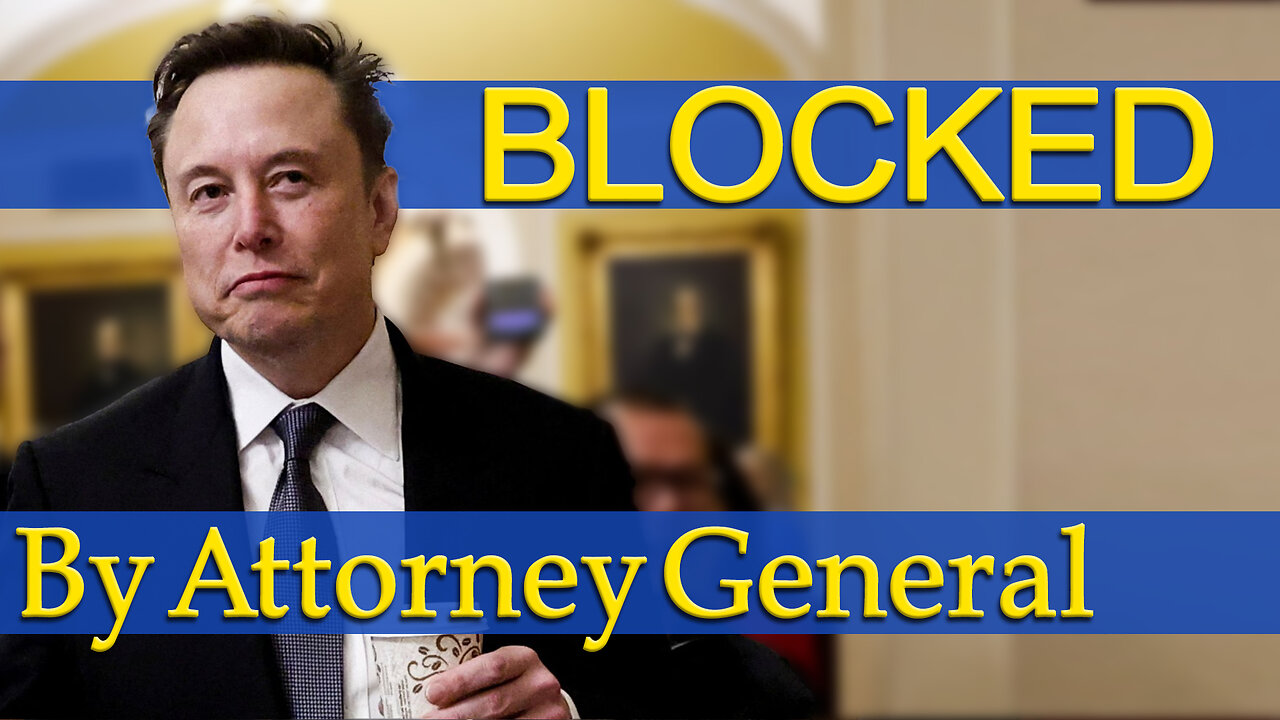Premium Only Content

AG Moves to Block Elon Musk Shocking Illegal Behavior!
In a dramatic escalation of the ongoing power struggle between government institutions and influential billionaire Elon Musk, New York Attorney General Letitia James has secured a significant preliminary injunction against Musk's Department of Government Efficiency (DOGE). The ruling, which was issued on February 21, 2025, puts a crucial brake on DOGE's unfettered access to the Treasury Department's central payment systems, protecting sensitive personal data from potential misuse.
The lawsuit, led by James alongside a coalition of 19 state attorneys general, challenges the Trump administration's controversial decision to grant DOGE unprecedented access to critical federal systems. The implications are serious. Concerns have emerged surrounding potential violations of federal privacy laws and significant cybersecurity threats posed by Musk's data requests. This ruling not only underscores the necessity of maintaining strict legal safeguards but reflects a growing consensus among state officials to push back against perceived governmental overreach.
"This is a victory for the privacy rights of everyday Americans," said James, addressing supporters during a press conference held shortly after the ruling. "We cannot allow a wealthy individual to threaten our citizens' most sensitive information without oversight."
As the political climate becomes increasingly contentious, Musk has faced a confluence of challenges. The backlash from a coalition of labor unions has culminated in legal action against the billionaire's sweeping directives demanding federal employees submit detailed reports of their accomplishments or face dismissal. Federal judges, including Deborah Boardman and Theodore Chang, have taken significant stances against Musk, revealing the complexities and challenges of his ambitious reformist agenda. Boardman's issuance of a restraining order reflects an understanding of employees' rights to privacy, while Chang's ruling on the administration's immigration policies illustrates disparate vulnerabilities in Trump's governmental strategies.
Further complicating matters, U.S. Representative Robert Garcia (D-CA) recently found himself in the crosshairs of the Attorney General's office, following his candid critique of Musk, which included a metaphorical reference to "stopping" the billionaire. Garcia's assertion that these actions represent an intimidation tactic underscores the broader struggle for free speech and democratic discourse amidst rising authoritarian tendencies in right-wing governance.
Political experts warn of the chilling repercussions of these events, arguing that targeting opponents of the Trump administration, especially those vocal about Musk's disruptive influence, could set a dangerous precedent. This trend was reinforced by inquiries into the activities of fellow Congresswoman Alexandria Ocasio-Cortez (D-NY), who drew scrutiny for advocating on behalf of civil rights in the face of federal immigration enforcement.
The implications of Letitia James's ruling reach beyond regulatory considerations; they signify a growing resistance among state officials to challenge the status quo of technocratic governance driven by corporate interests. As the legal battles unfold, the stakes could not be higher for federal employees, privacy advocates, and citizens concerned with transparency and accountability in government operations.
As Musk narrows his focus on efficiency and cost-cutting measures, the pushback from civil society and government officials heralds a new chapter in the ongoing dialogue about the role of tech titans in public governance. The question remains: will the checks and balances of American democracy prevail against the rising tide of privatization and corporate overreach? Only time will tell as this legal saga continues to evolve.
-
 55:46
55:46
The Dan Bongino Show
3 hours agoChange Is Coming, And All The Right People Are Panicking (Ep. 2430) - 02/25/2025
382K1.11K -
 1:11:08
1:11:08
The Rubin Report
1 hour agoTimothée Chalamet Stuns Crowd with Speech Pushing This Conservative Value
9.01K11 -
 LIVE
LIVE
Benny Johnson
1 hour ago🚨Deep State DESTROYING Evidence!? FBI Caught DELETING Files, Epstein List COVERUP | Investigate NOW
13,239 watching -
 2:00:34
2:00:34
Steven Crowder
3 hours ago🔴 False Reality: What Joy Reid's Firing Exposes About The Left
240K207 -
 1:34:39
1:34:39
Tucker Carlson
23 hours agoLuke Gromen: Why the CIA Doesn’t Want You Owning Gold, & Is Fort Knox Lying About Our Gold Reserve?
113K193 -
 1:03:56
1:03:56
Timcast
2 hours agoRachel Maddow SLAMS MSNBC As RACIST For Firing Joy Reid, Liberal Media HAS COLLAPSED | Timcast LIVE
50.9K41 -
 DVR
DVR
Bannons War Room
7 days agoWarRoom Live
1.73M339 -
 56:45
56:45
VSiNLive
2 hours ago $1.16 earnedA Numbers Game with Gill Alexander | Hour 1
10.2K2 -
 2:03:41
2:03:41
Matt Kohrs
10 hours agoMore Market Pain Incoming?! || The MK Show
102K2 -
 39:37
39:37
BonginoReport
6 hours agoCrybaby Crenshaw’s Latest Meltdown (Ep.147) - 02/25/2025
119K272